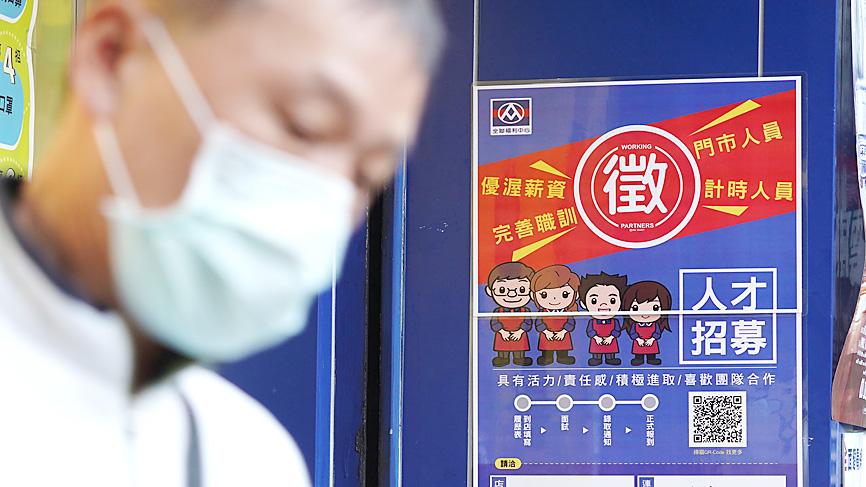The average monthly regular wage in January was NT$43,125 (US$1,527), a 2.07 percent increase from the same month last year and up 0.61 percent from December last year, the Directorate-General of Budget, Accounting and Statistics (DGBAS) said yesterday.
Including bonuses and other compensation, the overall average monthly wage fell 23.92 percent year-on-year, but increased 40.41 percent month-on-month to NT$75,145, as many employers offered bonuses before the Lunar New Year holiday, which was in February this year, but in January last year, the agency said in a report.
After adjustments for consumer inflation, which decreased 0.16 percent annually in January, the real average wage was NT$41,828 per month, an increase of 2.25 percent year-on-year, while the overall average wage, including bonuses and compensation, over the period dropped 23.79 percent to NT$72,886 per month, the DGBAS said.

Photo: CNA
The latest wage data were based on the agency’s survey of employees in the industrial and service sectors.
People working in the agricultural sector, at government agencies, schools or research institutes, and religious or occupational groups were not included in the survey.
The agency also published updated labor figures, showing that the total number of employees as of Jan. 31 was 8.168 million, up 0.26 percent year-on-year, the first annual increase in 10 months, and 0.18 percent month-on-month.
The average number of monthly working hours was 165.1 as of Jan. 31, up 19.3 hours from a year earlier, but down 17.7 hours from the previous month, the agency said.
Separately, the government last month collected NT$78.8 billion in tax revenue, up 2.4 percent from a year earlier, the Ministry of Finance said in a statement.
In the first two months, cumulative tax revenue increased 14.8 percent from a year earlier to NT$266.3 billion, the highest for the two-month period on record, as increases in revenues from securities transactions, and business and corporate income taxes were offset by decreases in revenues from individual income tax, the ministry said.
The biggest increase was in securities transaction tax revenue, which increased 122.2 percent year-on-year to NT$34 billion in the first two months, as local equity markets’ average daily turnover reached a record NT$416.9 billion, the ministry said.
The January-to-February tax revenue figure accounted for 10.9 percent of the government’s target for the first two months of this year, the ministry said.

TAKING STOCK: A Taiwanese cookware firm in Vietnam urged customers to assess inventory or place orders early so shipments can reach the US while tariffs are paused Taiwanese businesses in Vietnam are exploring alternatives after the White House imposed a 46 percent import duty on Vietnamese goods, following US President Donald Trump’s announcement of “reciprocal” tariffs on the US’ trading partners. Lo Shih-liang (羅世良), chairman of Brico Industry Co (裕茂工業), a Taiwanese company that manufactures cast iron cookware and stove components in Vietnam, said that more than 40 percent of his business was tied to the US market, describing the constant US policy shifts as an emotional roller coaster. “I work during the day and stay up all night watching the news. I’ve been following US news until 3am

UNCERTAINTY: Innolux activated a stringent supply chain management mechanism, as it did during the COVID-19 pandemic, to ensure optimal inventory levels for customers Flat-panel display makers AUO Corp (友達) and Innolux Corp (群創) yesterday said that about 12 to 20 percent of their display business is at risk of potential US tariffs and that they would relocate production or shipment destinations to mitigate the levies’ effects. US tariffs would have a direct impact of US$200 million on AUO’s revenue, company chairman Paul Peng (彭雙浪) told reporters on the sidelines of the Touch Taiwan trade show in Taipei yesterday. That would make up about 12 percent of the company’s overall revenue. To cope with the tariff uncertainty, AUO plans to allocate its production to manufacturing facilities in

Six years ago, LVMH’s billionaire CEO Bernard Arnault and US President Donald Trump cut the blue ribbon on a factory in rural Texas that would make designer handbags for Louis Vuitton, one of the world’s best-known luxury brands. However, since the high-profile opening, the factory has faced a host of problems limiting production, 11 former Louis Vuitton employees said. The site has consistently ranked among the worst-performing for Louis Vuitton globally, “significantly” underperforming other facilities, said three former Louis Vuitton workers and a senior industry source, who cited internal rankings shared with staff. The plant’s problems — which have not

TARIFF CONCERNS: The chipmaker cited global uncertainty from US tariffs and a weakening economic outlook, but said its Singapore expansion remains on track Vanguard International Semiconductor Corp (世界先進), a foundry service provider specializing in producing power management and display driver chips, yesterday withdrew its full-year revenue projection of moderate growth for this year, as escalating US tariff tensions raised uncertainty and concern about a potential economic recession. The Hsinchu-based chipmaker in February said revenues this year would grow mildly from last year based on improving supply chain inventory levels and market demand. At the time, it also anticipated gradual quarter revenue growth. However, the US’ sweeping tariff policy has upended the industry’s supply chains and weakened economic prospects for the world economy, it said. “Now